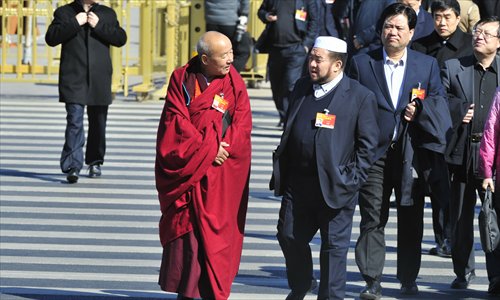Govt decides reincarnation
China to promote ethnic integration, recognition

Several political advisers on ethnic and religious affairs gather in front of the Great Hall of the People in Beijing on Wednesday. Photo: CFP
The reincarnation of the Dalai Lama has to be endorsed by China's central government, instead of himself or anyone else, a top Chinese official of ethnic and religious affairs said Wednesday.
It is "double betrayal" to both his country and religious faith for the Dalai Lama to claim an end to the reincarnation system when he dies, said Zhu Weiqun, chairman of the Ethnic and Religious Committee under the CPPCC. The Dalai Lama had suggested when talking to the media that the title could carry on no more when he dies.
The reincarnation of the Dalai Lama has seen a series of religious rituals and conventions over hundreds of years, and "every step had to be reported to the central government and get an approval," Zhu said. In Tibetan Buddhism, a senior lama is reincarnated to the body of a child when he dies.
"The 14th Dalai Lama hasn't shown a serious or respectful attitude on this issue," Zhu said. "He sometimes says he will reincarnate as a foreigner in a place where he visits, sometimes to a woman. When someone gives him a bottle of honey, he would happily say he is going to become a bee in the next life."
A top Tibet Autonomous Region official also slammed the Dalai Lama's blasphemy for suggesting an end to reincarnation on Monday.
Xiong Kunxin, a professor in ethnic policies at the Minzu University of China, said even if the Dalai Lama announced that he would not be reincarnated when he dies, the central government could still set out to search for his reincarnation according to Buddhist rules and foster him. "It's not up to the Dalai Lama to decide whether or not to reincarnate."
In recent years, fewer foreign leaders have met with the Dalai Lama. Zhu said that's because of the Dalai Lama's declining influence. Hyping the reincarnation issue is part of the Dalai Lama's conspiracy with his separatist group to retain control of the title in order to serve his purposes, Zhu said.
"Some people who can't distinguish good from bad still meet and dine with him, and they will lose the Chinese people's respect," Zhu added.
On China's ethnic policies, Zhu said ethnic integration and its recognition of the Chinese nation would be stressed in the future, but it will not dilute ethnic cultures. "Integration will contribute to the sharing and enjoyment of excellent cultural features of every ethnicity for all," he said.
Xiong echoed Zhu, adding that it will take some time to achieve integration, with communication between different ethnic groups essential to the process.
Though "it should be a natural and gradual process," the government should also provide opportunities and convenience through policymaking to allow them to learn from each other, said Xiong.